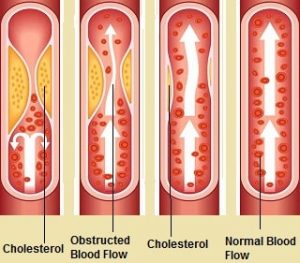Hardening of vessels or Arteriosclerosis
Hardening of vessels , Arteriosclerosis
Arteriosclerosis happens when the blood vessels (that carry oxygen and nutrients from your heart to the rest of your body) become thick and stiff. This condition restricts blood flow to your organs and tissues. Healthy arteries are flexible and elastic. But with the time, the walls in your arteries harden known as hardening of the arteries.
Atherosclerosis is a type of arteriosclerosis. Atherosclerosis means the buildup of fats, cholesterol, or plaque that restricts blood flow. The plaque bursts and makes a blood clot. Although atherosclerosis is considered a heart problem, it affects arteries everywhere in the body. Atherosclerosis is preventable and is treatable.
Symptoms
Atherosclerosis progresses gradually. Mild atherosclerosis usually does not have any visible symptoms. A person does not show any symptoms until an artery is narrowed or clogged. Sometimes a blood clot completely blocks blood flow, or even breaks, and also triggers a heart attack or stroke. Symptoms of mild to severe atherosclerosis depend on which arteries are affected. Common signs and symptoms are:
- Chest pain or angina

- Pain in arms, legs, or any place where the artery is blocked
- Shortness of breath
- Fatigue
- Confusion
- Muscle weakness
- Dizziness
- Sweating
Causes
Atherosclerosis is a slow, progressive disease that may begin early. Atherosclerosis starts with damage or injury to the inner layer of an artery or buildup in the artery. The damage can be caused by:
- High blood pressure
- High cholesterol
- High triglycerides, high level of lipid in the blood
- Smoking and other sources of tobacco
- Obesity
- Diabetes
- Inflammation from diseases, such as arthritis, lupus or infections, or inflammation because of unknown causes.
Treatment
Lifestyle changes like eating a healthy diet and regular exercising, are the most appropriate treatment for atherosclerosis. In severe cases, medication or surgical procedures are also referred.
Medications
The use of various drugs can slow or reverse the effects of atherosclerosis. Here are some medications that can be effective in treating atherosclerosis. But make sure never to take any medicine without the doctor’s prescription or advice.
- Cholesterol medication such as statins, fibrates.
- Anti-platelet medications like aspirin
- Beta-blockers
- Angiotensin-converting enzyme (ACE) Inhibitors
- Calcium channel blockers
- Diuretics
- Medications for diabetes
Surgical procedures
Combinations with medications, some surgical procedures are recommended. If the patient shows severe symptoms or a blockage that threatens muscle or skin tissue survival. One of the following surgical procedures can be referred to:
- Angioplasty or stent placement
- Endarterectomy
- Fibrinolytic therapy
- Bypass surgery
Some other lifestyle changes can also help like
- Quit smoking
- Regular or 5 days exercise
- Eat a balanced healthy diet
- Maintain a healthy weight
- Reduce stress and relax as much as you can. This will help in muscle relaxation.
